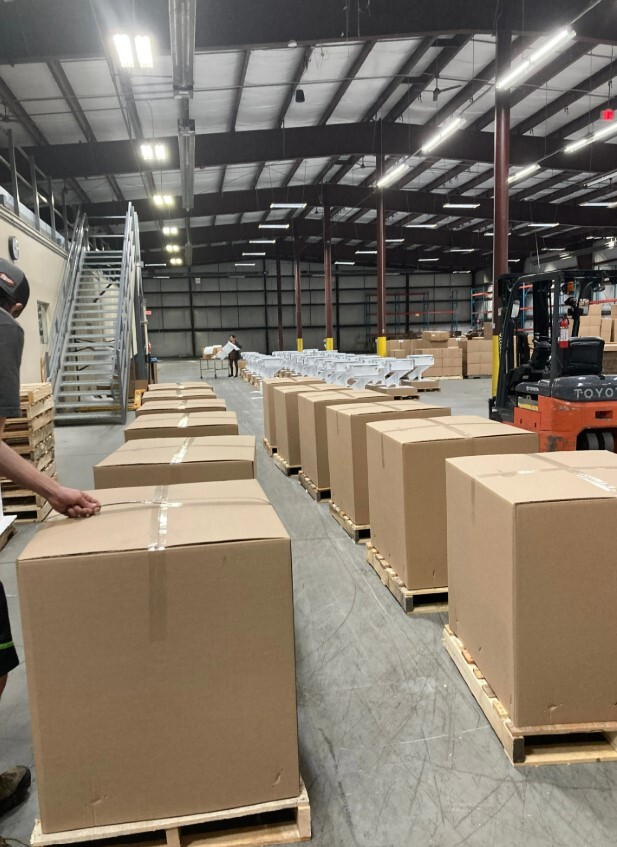Made in the USA. Challenges and Considerations for Healthcare IT Buyers and IT Integrators in 2025
By First Products on Jun 19th 2025
The healthcare market has been disrupted in recent years by value-based care, EHR initiatives, and the COVID-19 pandemic. With these challenges, the demand for robust healthcare delivery solutions has grown. Mobile cart solutions that offer rugged, modular, and hygienic features have increasingly been called upon to address healthcare needs in a wide array of unconventional healthcare environments.
The latest challenge influencing the healthcare industry’s approach to purchasing decisions relates to national policy shifts around trade, manufacturing, and domestic sourcing, aka Made In USA. Healthcare buyers on GSA (General Services Administration) contracts, healthcare IT integrators, and medical equipment manufacturers face heightened concerns about how best to face these challenges. First Products, even with a long history of American healthcare innovation, is navigating the shifts alongside its clients, offering fresh perspectives on the nuances and value of US-based manufacturing.
This article addresses the Made in the USA approach to buying medical equipment, highlights some challenges buyers and integrators face, and offers practical guidance when selecting a reliable and compliant US-based manufacturing partner in this evolving healthcare landscape.
“Made in USA” vs. “Made in America” — What’s the Difference?
These two statements are relevant to the discussion but may sometimes confuse when addressing legal requirements in regulated environments like healthcare and federal procurement. Here’s a quick breakdown.
The Federal Trade Commission (FTC) designates that a product labeled “Made in USA” must be all or virtually all made in the United States. This means significant processing, assembly, and the origin of major components must be US-made. For instance, in medical cart manufacturing:
- The frame, electronics housing, power supply, and wiring must be sourced and assembled in the U.S.
- Minimal foreign content is allowed (under 5–10%).
“Made In America,” on the other hand, generally refers to products made anywhere in North America, including the United States, Canada, and Mexico. Whether to communicate patriotism or regional origin, there is no formal legal FTC standard or accountability for this term. As well, “Made in America” doesn’t guarantee compliance with U.S. federal sourcing laws like the Buy American Act (BAA) or the Trade Agreements Act (TAA).

How Made in the USA is Influencing Healthcare Purchasing in 2025
The current presidential administration is emphasizing the reshoring of manufacturing to stimulate domestic growth, reduce reliance on foreign imports, and prioritize American-made goods in federal procurement. This focus shift reveals concerns in the healthcare industry about supply chain reliability, as US-made products and components, like mobile healthcare carts, must address both quality standards and federal compliance expectations.
For healthcare IT buyers, key concerns include:
- Cost and Procurement Complexity. Navigating procurement without delays, avoiding sudden price swings, and being able to switch to compliant vendors easily when complex integrations are involved.
- Certification and Compliance Confusion. With federal guidelines under review, buyers will be wary of products that don’t align with Buy American Act or Trade Agreements Act (TAA) standards. Missteps can jeopardize federal funding or delay projects.
- Supply Chain Timelines. Buyers are vulnerable to overseas disruptions caused by policy changes or sourcing constraints, leading to extended lead times.
For healthcare IT integrators, key concerns include:
- Vendor Vetting Complexity. Verifying product quality and origin — including sourcing, final assembly, and labor standards.
- Interoperability with Legacy Systems. Many integrators work with hybrid environments — older carts, newer software, and a mix of domestic and foreign components — making compliance a logistical challenge.
- Client Education and Policy Communication. Acting as consultants to help clients understand how trade policy shifts and federal guidelines impact purchasing plans.
Mislabeling “Made in USA” on actual products may result in FTC enforcement, so buyers following strict federal requirements will need proof of compliance.
Selecting Made in USA Manufacturing Partners for Compliance and Reliability
For healthcare organizations prioritizing "Made in USA" products, partnering with manufacturers committed to domestic production helps ensure compliance with federal regulations.
Here are a few considerations when prioritizing vendors. Look for manufacturers who:
- Offer documentation about their supply chains, assembly locations, and compliance with U.S. manufacturing standards.
- Clearly label products with the appropriate labels.
- Offer modular, customizable designs for functionality and flexibility in healthcare, including ergonomics and ease of integration.
- Collaborate to pre-configure carts for specific platforms, devices, or needs.
- Address security and infrastructure resilience concerns with tamper-proof locks, secure cable routing, and antimicrobial materials.
- Ensure transparency to prevent hidden costs, delays, or reputational risks.
- Have completed ISO certification for manufacturing excellence.

First Products: Proudly Manufacturing for 80 Years

There isn’t much First hasn’t seen in the way of healthcare innovation over the decades. Based in Lockport, NY, our ISO 9001:2015 certified manufacturing facility serves as a complete end-to-end solution hub where we design, engineer, prototype, assemble, integrate, warehouse, and ship custom-configured solutions.
While we utilize a global supply chain for key components, our U.S.-based team enables rapid prototyping, flexible customization, and quality-controlled production — ensuring your Perfect Fit solutions are delivered with the reliability and responsiveness of American manufacturing. As a third-generation, family-owned business, First brings deep experience to the manufacturing and customizing of medical carts and mounts.
We leverage our U.S. manufacturing, with a strong domestic supply chain, to deliver high-quality, adaptable, and flexible solutions in healthcare, education, government, and other markets. Our service-driven approach shortens the gap between design and deliverables, mitigating risks while ensuring reliability and compliance.
